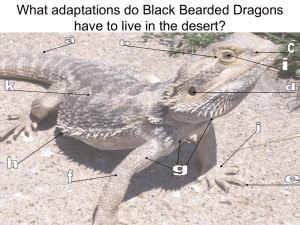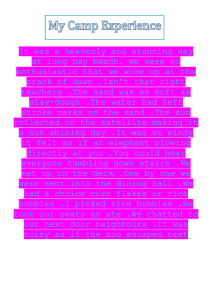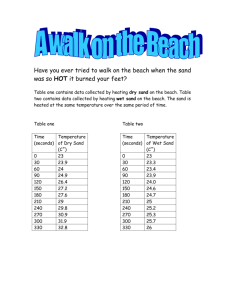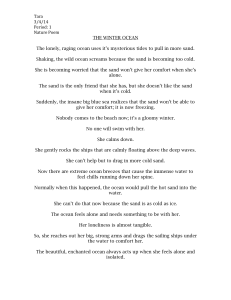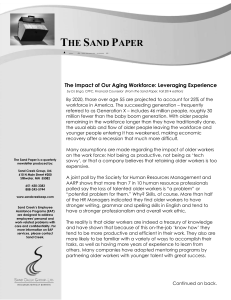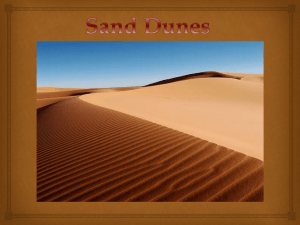Long Term Plan for Sand play
advertisement
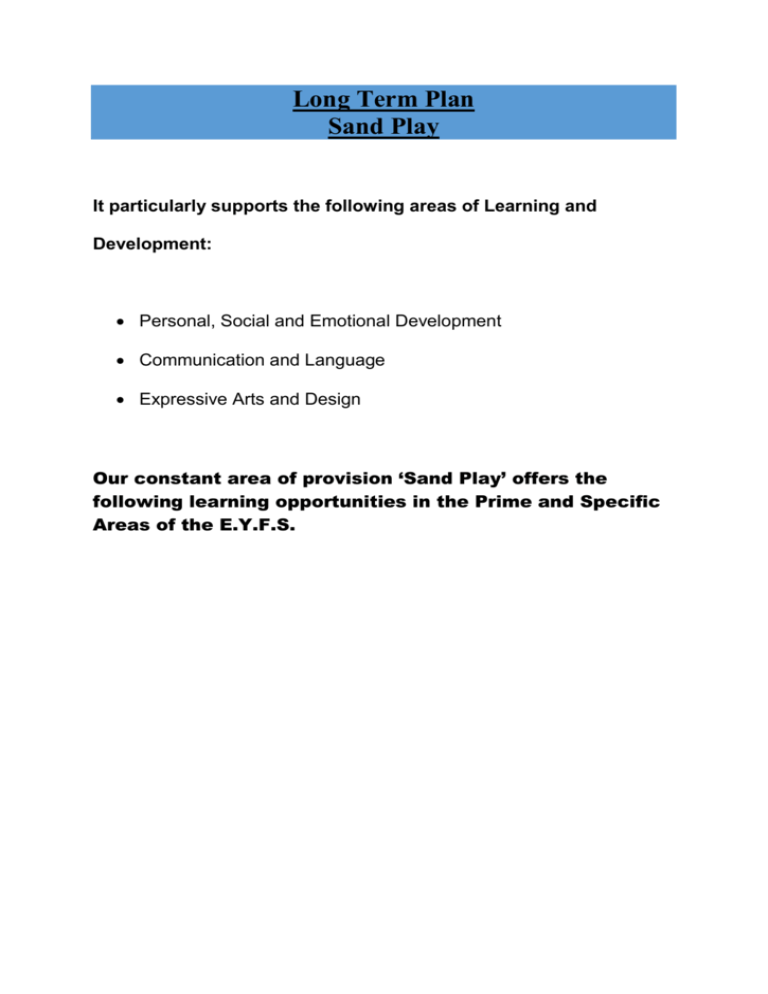
Long Term Plan Sand Play It particularly supports the following areas of Learning and Development: Personal, Social and Emotional Development Communication and Language Expressive Arts and Design Our constant area of provision ‘Sand Play’ offers the following learning opportunities in the Prime and Specific Areas of the E.Y.F.S. Sand Play Areas of Learning and Development Learning opportunities Prime Areas Personal, Social, and Emotional Development Communication and Language Physical Development learn how to work independently and select equipment co-operate, take turns and share equipment as part of a group learn to respect others’ ideas extend imagination when developing ideas in the sand e.g. using the play people to make up a story in the sand, adding natural materials learn to use the sand safely and with consideration for others talk about what they have done in the sand with confidence and a sense of achievement develop self-esteem by seeing displays of learning in the sand experience the therapeutic value of working with wet/dry sand describe the properties of sand e.g. rough, smooth, sticky, wet extend vocabulary associated with sand play e.g. pour, fill, empty, full, soft, bucket, sand wheel, sieve, mould dig, tunnel, rake, smooth, names of sand toys describe their actions and the actions of others e.g. pushing, pulling, scooping ask and answer questions recall and report back at group times develop pre-writing skills e.g. making patterns, marks Develop fine motor skills through manipulating tools, pouring, filling, stirring, pushing, pulling, digging, patting, moulding, drawing etc. develop hand/eye co-ordination e.g. pouring sand into containers, making sand shapes using moulds use a range of equipment with increasing skill e.g. balance, sand wheel, sieves be aware of the space in the sand tray and be able to share it with others use their senses to observe changes in sand e.g. adding water to dry sand select appropriate equipment for different types of sand play use building skills Specific Areas Understanding the World Mathematics •talk about their local environment eg. beach, building site •relate feature of their play environment to features of their own environment with the addition of suitable resources •make physical features such as hills, tunnels, roads •change the sensory nature of sand e.g. add pasta, change dry to wet/very wet sand explore various mathematical concepts e.g. capacity, size, weight understand and use mathematical language e.g. full, empty, need more/less, heavy, light, straight/curved lines, names of common shapes make shapes and patterns in the sand solve problems associated e.g. how much will specific container hold? dry sand into a of different sizes containers with sand a Pouring variety of Expressive Arts and Design Literacy •explore the properties of dry/wet sand – compare •look at similarities, differences, patterns in dry/wet sand extend vocabulary associated with sand play e.g. pour, fill, empty, full, soft, bucket, sand wheel, sieve, mould dig, tunnel, rake, smooth, names of sand toys describe their actions and the actions of others e.g. pushing, pulling, scooping ask and answer questions recall and report back at group times develop pre-writing skills e.g. making patterns, marks make up stories using additional props such as play people, farm animals, vehicles talk about their experiences in the sand from displays of photographs or books about sand play have access to a variety of stories e.g. The Beach, Lucy and Tom at the Seaside make up stories using additional props such as play people, farm animals, vehicles talk about their experiences in the sand from displays of photographs or books about sand play have access to a variety of stories. Prime Communication Physical Development and Language Speaking Understanding Listening and attention Moving and handling Health and self care Areas Personal, Social and Emotional Development Making relationships Specific Areas Literacy Mathematics Understanding Expressive the World Arts and Design writing Numbers Shapes, space and measures The world People and communities technology Being imaginative Exploring and using media materials
